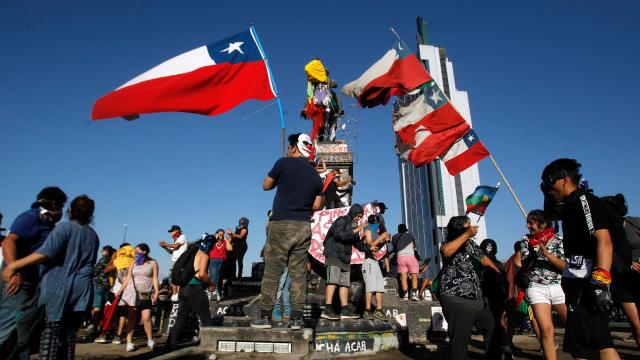International climate talks were supposed to be in Chile this year. Instead, the Chilean government withdrew from hosting the 25th Conference of the Parties (COP25) after anti-neoliberalism protests took over the streets. The talks are happening now in Spain, and mass actions are planned there.
But some climate advocates are still headed to Chile to stand with comrades who are challenging the very economic system that’s fuelling the climate crisis. A group from the It Takes Roots alliance”which represents more than 200 environmental organisations across the U.S.”is among those who arrived in Chile this week.
“A lot of us come from families that have immigrated from the Global South… and are really feeling that a lot of what is going on here in Chile really resonates in our communities back home,” Tere Almaguer, an environmental justice organiser with San Francisco-based PODER who is in Chile this week, told Earther. “Back home in San Francisco, we feel like a lot of our public lands are being privatised. We feel like the government is catering to corporations and developers that are all about the profit and not the people who make up this city.”
[referenced url=” thumb=” title=” excerpt=”]
Chilean protestors have been in the streets since October raising concerns over similar issues. A subway fare increase was the spark that ignited the protests against Chile’s centre-right government and austerity. Protestors have been fighting against more than the fare increase, though. They’re taking a stand against the neoliberal system that has driven income inequality to some of the highest levels in the world.
“Due to all these concerns, Chile is waking up,” Mafalda Galdames, a member of the World March of Women and the Chile-based indigenous organisation ANAMURI, told Earther.
Making public transit more expensive? That’s the opposite of what needs to be done to reduce greenhouse gas emissions. But calling out expensive public transit and suffering violence at the hands of police are only the beginning of the Chilean revolution’s connection to the climate movement, though. The neoliberal capitalist system is exactly to blame for the climate and ecological crisis the world faces. This system has let corporations get away with extracting and polluting, creating this mess we’re in. And Chile is ground zero.
It’s one of the only countries in the world that privatizes its water resources. As a result, the country sends water to agricultural centres where resources like avocados are produced and exported, instead of leaving water for communities, James Blair, an assistant professor of anthropology at California State Polytechnic University who’s also skipping the climate talks to be in Chile this week, told Earther. He said he has more FOMO about missing the events in Chile than he does “missing what’s happening in the meetings where they’re just debating about where to put a comma in the implementation of the Paris Agreement.”
The country is also the world’s top copper producer. Not only does mining require a shit ton of this precious water; mining is also a huge source of pollution. Authorities have a record of dumping Chile’s mining waste into the surrounding ocean.
Countries in the Global South, such as Chile, turn to these types of extractive industries”which harm the environment and climate”because they’re under pressure to grow their economies so they can escape the debt this socioeconomic system has forced upon them. The financial assistance the Global South receives from international institutions such as the World Bank comes with a serious cost. Practices that place profits over people is what Chilean protestors want to overthrow. So do climate activists.
“On the one hand, there’s been a lot of repression and violence that has been really ugly,” Blair said. “But, on the other hand, it’s a moment where people feel liberated and excited and feel opportunity here.”
And the opportunity is to free themselves from the greed underlying it all and work toward a more just system that works for everyone. If that sounds familiar, it’s because that’s what the struggle over climate change is about. Greed is why fossil fuel companies funded climate denial despite knowing for decades. And today’s climate movement is trying to combat that by getting companies to wind down fossil fuel production while making sure workers and frontline communities aren’t screwed.
Galdames had hoped world leaders would hear the message from Chileans firsthand when they came for COP25. Though they’re in Madrid instead, Galdames still hopes those leaders recognise that the transformation the world needs to address climate change must go far deeper than market fixes. In particular, she worries that world leaders will propose “false solutions” to draw down carbon emissions like offsets that still allow companies to emit as long as they pay to offset pollution elsewhere. That may involve buying trees in the Amazon where indigenous people live, ultimately kicking them off their land that’s already under assault from illegal logging, mining, and fossil fuel extraction.
“For us,” Galdames said, “the motto is let’s save the earth, let’s change the system.”
Unfortunately, people in Chile can’t just buy a visa and travel to Spain to communicate these concerns directly with leaders. That’s why they’ve called on allies to join them this week for the annual Cumbre de Los Pueblos that lasts until Friday. This time around, the summit is focusing on the climate emergency. Sessions include topics such as a just transition, climate migrants, and ecosocialism. And U.S. advocates are glad to be there.
“We believe that the solutions have never come from the government, especially because the governments are very influenced by corporations,” Almaguer said. “We can’t just sit around and wait for world leaders to make decisions that we see are false solutions.”
So as presidents, prime ministers, and other high ranking officials gather in Madrid to talk about how to address the climate crisis without sacrificing their countries’ economies, frontline communities are in Chile sharing the ideas they believe will end the suffering poor people everywhere have been living with for far too long.
